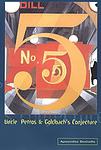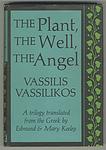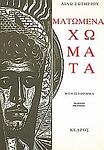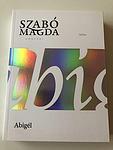The Greatest Hungarian, Greek "Fiction" Books Since 1950
Click to learn how this list is calculated.
This list represents a comprehensive and trusted collection of the greatest books. Developed through a specialized algorithm, it brings together 300 'best of' book lists to form a definitive guide to the world's most acclaimed books. For those interested in how these books are chosen, additional details can be found on the rankings page.
Genres
Countries
Date Range
Reading Statistics
Click the button below to see how many of these books you've read!
Download
If you're interested in downloading this list as a CSV file for use in a spreadsheet application, you can easily do so by clicking the button below. Please note that to ensure a manageable file size and faster download, the CSV will include details for only the first 500 books.
Download-
1. Fateless by Imre Kertész
"Fateless" is a harrowing account of a Hungarian Jewish boy's experiences in Nazi concentration camps during World War II. The protagonist is sent to Auschwitz, then Buchenwald, and finally to a factory in Zeitz, enduring brutal conditions and witnessing unimaginable horrors. Despite his experiences, he maintains a detached, almost indifferent perspective, focusing on the mundane aspects of life in the camps, which further highlights the absurdity and horror of the situation. The novel explores themes of identity, survival, and the arbitrary nature of fate.
-
2. The Last Temptation of Christ by Nikos Kazantzakis
This novel presents an alternative interpretation of the life of Jesus Christ, who is depicted as a conflicted, all-too-human figure who struggles with his divine destiny. The book explores his journey through life, his friendships, his fears, and his ultimate temptation to avoid crucifixion and live a normal life. The narrative delves into the psychological and emotional aspects of his experiences, creating a complex, humanized portrayal of a traditionally divine figure.
-
3. The Notebook: The Proof ; The Third Lie : Three Novels by Agota Kristof
"The Notebook: The Proof ; The Third Lie : Three Novels" is a trilogy of novels that follow the lives of twin brothers, living through the harsh realities of war, separation, and betrayal. The first novel, "The Notebook," tells the story of their survival as children in a rural town at the end of World War II. The second book, "The Proof," continues their story into adulthood, exploring the effects of their traumatic childhood. The final book, "The Third Lie," delves into the complexities of their relationship and the secrets they kept from one another. The trilogy is a poignant exploration of identity, love, and the enduring bond of brotherhood.
-
4. Z by Vassilis Vassilikos
"Z" is a political novel that explores the events surrounding the assassination of a prominent leftist politician in Greece. The story delves into the corruption and violence that pervades the government, with the narrative alternating between the perspectives of the victim, the assassins, the investigators, and the government officials involved. The novel is a critique of political tyranny and an exploration of the struggle for justice in a corrupt system.
-
5. Celestial Harmonies by Peter Esterhazy
"Celestial Harmonies" is a historical novel that tells the story of the aristocratic Esterházy family, tracing their lineage from the late Middle Ages to the present day. The narrative is divided into two parts, with the first part featuring a series of vignettes about the family's ancestors, while the second part focuses on the experiences of the narrator's father under the Communist regime in Hungary. The novel is characterized by its intricate structure, complex themes, and lush, poetic language, offering a rich exploration of Hungarian history, family dynamics, and the human condition.
-
6. The Door by Szabó, Magda
"The Door" by Magda Szabo is a novel about the relationship between two women, one of whom is a writer and the other is her housekeeper. The story explores themes of class, power, and the complexities of human relationships. As the two women become increasingly intertwined, their relationship becomes more and more complicated, leading to unexpected consequences for both of them. The novel is a powerful exploration of the human condition, and a poignant reminder of the importance of understanding and empathy in our interactions with others.
-
7. The Case Worker by György Konrád
"The Case Worker" is a novel that follows the life of a young, disillusioned social worker in Hungary who is struggling with the grim realities of his job. He is constantly faced with the harsh and desperate situations of his clients, which include the poor, the mentally ill, and the elderly. As he tries to help them, he becomes increasingly aware of the bureaucratic and social systems that often hinder rather than aid these vulnerable individuals. This leads him to question the effectiveness of his role and the larger societal structures in place.
-
8. The Third Wedding by Kōstas Tachtsēs
"The Third Wedding" is a powerful exploration of love, passion, and societal expectations set in mid-20th century Greece. The story revolves around a strong-willed and independent woman who has been married twice and is about to enter her third marriage. The narrative delves into her past love affairs, her struggle with the societal norms of the time, and her quest for personal freedom. The book is a poignant commentary on the condition of women in a patriarchal society and the sacrifices they make in the name of love and duty.
-
9. Epepe by Ferenc Karinthy
The book revolves around a linguist who finds himself inexplicably trapped in a nightmarish city where he cannot understand the language or communicate with the inhabitants. Despite his expertise in languages, the protagonist's skills are rendered useless in this alien environment, leading to a series of Kafkaesque encounters as he desperately tries to make sense of his surroundings and find a way back home. His isolation is compounded by the city's indifferent bureaucracy and the strange, often absurd, customs of its citizens, turning his ordeal into an existential struggle for identity and understanding in the face of an incomprehensible world.
-
10. The Melancholy of Resistance by László Krasznahorkai
"The Melancholy of Resistance" is a surreal and philosophical novel set in a small Hungarian town that becomes isolated by a massive snowstorm. The arrival of a mysterious circus, featuring a stuffed whale and a silent, enigmatic leader, brings with it a wave of change and unrest. The narrative explores themes of chaos, resistance, and the struggle for power through the perspectives of various townsfolk, including a reclusive music theorist and a former political dissident. The novel is known for its complex, long-winded sentences and its bleak yet profound examination of human nature and society.
-
11. The Daughter by Pavlos Matesis
"The Daughter" is a powerful novel set in Greece during the Second World War. The narrative follows the life of a young girl who is forced to grow up quickly due to the harsh realities of war. Her father, a communist, is executed by the Germans, and the girl is left to navigate the complexities of life, politics, and love in a world that is rapidly changing. The book offers a poignant exploration of the human capacity for resilience, survival, and hope in the face of unimaginable adversity.
-
12. Astradeni by Eugenia Fakinou
"Astradeni" is a coming-of-age novel set in post-World War II Greece. The story follows the life of a young girl named Astradeni, who is forced to grow up quickly due to the harsh realities of war and poverty. Despite the hardships she faces, Astradeni maintains a hopeful and imaginative spirit, often escaping into a world of myths and legends. The novel explores themes of resilience, the power of storytelling, and the enduring strength of the human spirit.
-
13. Uncle Petros and Goldbach's Conjecture by Apostolos Doxiadis
The novel follows the story of a young man who becomes fascinated by his reclusive and eccentric Uncle Petros. As he delves into his uncle's past, he uncovers Petros' obsession with proving Goldbach's Conjecture, a famous unsolved problem in number theory. This obsession led to Petros' alienation from society and ultimately his downfall. The book explores themes of mathematical obsession, family relationships, and the fine line between genius and madness.
-
14. The Plant, The Well, The Angel by Vassilis Vassilikos
This novel weaves a complex narrative that explores the interconnectedness of human life, nature, and the divine. Through the symbolic elements of a plant, a well, and an angel, the story delves into themes of growth, discovery, and spiritual awakening. Set against a backdrop that blends the mundane with the mystical, the narrative follows the journey of its characters as they navigate personal and collective challenges, ultimately seeking redemption and enlightenment. The author masterfully uses these symbols to reflect on the essence of existence, the cycles of life, and the pursuit of meaning in a world filled with both beauty and hardship.
-
15. Ο Εξώστης by Nikos Kakhtitsis
This novel delves into the life of a young man grappling with his sexual identity amidst the conservative and oppressive societal norms of mid-20th century Greece. Through a series of introspective monologues and vivid encounters, the protagonist navigates the complexities of desire, shame, and the longing for acceptance. Set against the backdrop of post-war Greece, the narrative explores themes of alienation, the struggle for self-realization, and the quest for freedom in a rigidly structured society. The protagonist's journey is a poignant reflection on the human condition, offering a deep exploration of the internal and external conflicts arising from societal expectations and personal identity.
-
16. The Flaw by Antonis Samarakis
The book is a gripping narrative set in an unnamed totalitarian state, where the protagonist, a government clerk, finds himself inadvertently embroiled in a complex web of political intrigue and moral dilemmas after discovering a minor error in a routine report. This seemingly insignificant flaw sets off a chain of events that exposes the oppressive and corrupt nature of the regime, challenging the protagonist's loyalties and beliefs. As he navigates through a dangerous landscape of surveillance, betrayal, and resistance, the story explores themes of power, conscience, and the human spirit's resilience against authoritarianism. Through its tense and thought-provoking plot, the novel serves as a poignant critique of totalitarian systems and a testament to the individual's struggle for justice and freedom.
-
17. Ματωμένα Χώματα by Dido Sotiriou
This novel is a poignant narrative set against the backdrop of the Greco-Turkish War and the subsequent population exchange between Greece and Turkey in the early 20th century. It tells the harrowing story of a Greek family living in Asia Minor who are forced to flee their ancestral home amidst the violence and upheaval of the time. Through their journey, the book explores themes of identity, loss, and the enduring human spirit in the face of displacement and tragedy. The narrative serves as a powerful testament to the resilience of individuals caught in the crossfire of historical events, and a reminder of the personal stories behind the broad strokes of history.
-
18. Το Τρίτο Στεφάνι by Kostas Taktsis
This novel is a poignant exploration of the complexities of love, societal norms, and personal identity in post-war Greece. Through the eyes of its protagonist, a young man navigating his sexual identity amidst the conservative and often oppressive societal expectations of the time, the narrative delves into themes of love, loss, and the search for personal freedom. Set against the backdrop of Athens in the mid-20th century, the story weaves together the protagonist's intimate experiences with broader social and political changes, offering a deeply human and moving portrayal of the struggle for self-acceptance and the courage to live authentically.
-
19. Drifting Cities by Stratis Tsirkas
Set against the backdrop of World War II and the subsequent civil war in Greece, this novel weaves together the lives of a diverse group of characters who find themselves in Jerusalem, Cairo, and Alexandria. Through their interconnected stories, the narrative explores themes of identity, displacement, and the quest for personal and political freedom. The cities, each with their own unique atmosphere and challenges, serve as more than mere settings; they are integral to the characters' experiences, reflecting the broader historical and cultural shifts of the mid-20th century. As these individuals navigate love, betrayal, and the struggle for a sense of belonging, the book offers a rich tapestry of human resilience and the complexities of home in times of turmoil.
-
20. The Story Of Andreas Kordopatis by Thanassis Valtinos
This novel unfolds the life journey of Andreas Kordopatis, tracing his odyssey from his origins in the Peloponnese, through his ventures in the United States and his return to Greece. Set against the backdrop of the late 19th and early 20th centuries, the narrative weaves through the personal and historical, exploring themes of migration, identity, and the pursuit of a better life. Through a blend of personal accounts, letters, and third-person narration, the reader is immersed in the struggles and aspirations of a man navigating the complexities of diaspora and the relentless quest for home and belonging amidst the turbulent tides of history.
-
21. Η κρύπτη by Ε.Χ. Γονατάς
The book unfolds within the mysterious and eerie confines of a crypt, where secrets from the past and present intertwine. As the protagonist delves deeper into the crypt's enigmatic depths, they encounter a series of cryptic clues and supernatural occurrences that challenge their understanding of reality. The narrative masterfully blends elements of horror, mystery, and historical fiction, leading readers on a suspenseful journey through time and darkness. The crypt, with its ancient allure and hidden dangers, becomes a character in its own right, revealing truths that are as unsettling as they are enlightening, ultimately confronting the protagonist with a revelation that could alter their perception of life and death.
-
22. Η Σαρκοφαγος by Giorgos Ioannou
This book delves into the complexities of human nature, society, and the existential dilemmas faced by individuals in post-war Greece. Through a series of interconnected stories, the narrative explores themes of loss, despair, and the search for meaning in a world marked by political turmoil and social change. The author masterfully portrays the struggles of ordinary people trying to find their place in a rapidly evolving society, using vivid imagery and deep psychological insight to bring his characters to life. The work is a poignant reflection on the human condition, offering a critical look at the challenges of adapting to a new reality while clinging to the remnants of the past.
-
23. The End Of Our Small Town by Dimitris Hatzis
This novel delves into the profound transformation of a small Greek town during the tumultuous period of the Greek Civil War and the subsequent years, reflecting on the broader socio-political upheavals of Greece in the mid-20th century. Through the eyes of its inhabitants, the narrative explores themes of love, betrayal, and the struggle for survival amidst changing political tides. The story captures the essence of human resilience and the impact of historical events on personal lives and community bonds, painting a vivid picture of a town and its people navigating the challenging journey from a traditional past towards a modern identity.
-
24. Βιοτεχνία Υαλικών by Menis Koumandareas
This novel delves into the life of a glass craftsman in Athens, exploring the intricate balance between tradition and the encroaching modernity of the 20th century. Through the protagonist's struggles and experiences, the narrative paints a vivid picture of the societal changes in Greece, highlighting the challenges faced by artisans trying to preserve their heritage and livelihoods amidst rapid industrialization and cultural shifts. The story is not just about the craft of glassmaking, but also a poignant commentary on the human condition, resilience, and the inevitable transformation of societies over time.
-
25. Abigél by Szabó, Magda
Set against the backdrop of World War II in Hungary, the novel follows a young girl sent to a strict boarding school in the countryside by her father, a high-ranking general who fears for her safety amidst the war. Struggling to fit in and feeling abandoned, she eventually discovers the school harbors deep secrets, including the mysterious "Abigél," a statue that seems to be at the center of a clandestine operation protecting those persecuted by the war. As the protagonist navigates the complexities of adolescence, authority, and the harsh realities of her time, she learns valuable lessons about trust, loyalty, and the power of community in the face of adversity.
Reading Statistics
Click the button below to see how many of these books you've read!
Download
If you're interested in downloading this list as a CSV file for use in a spreadsheet application, you can easily do so by clicking the button below. Please note that to ensure a manageable file size and faster download, the CSV will include details for only the first 500 books.
Download















